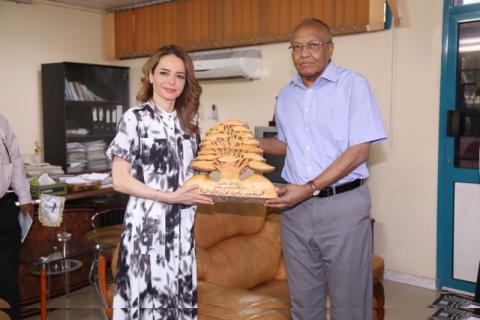
Mrs. Kassem with Khartoum State Minister of Health Mamoun Mohamed Ali Homeida
Within the framework of the Arab Traffic Safety Week, Roads for Life (RFL) visited the Sudan at the official invitation of the Sudanese Ministry of Health – State of Khartoum in cooperation with the Traffic Police Command in Khartoum and the University of Medical Sciences and Technology (UMST). RFL received information on the traffic control system implemented by the Sudanese police in the capital and on the needs of the UMST, which is willing to adopt the rescue programs provided by RFL in Lebanon.
The importance of this event lies in the fact that Lebanon is exporting its expertise to the Arab world. This illustrates the growing importance attached by the United Nations to the fifth pillar of the United Nations Decade of Action for Road Safety 2011-2020 on the golden hour to rescue road accident victims around the world.
Kassem
RFL President Zeina Kassem was a guest speaker at this event and in the Sudanese media. Speaking from the headquarters of the traffic police in Khartoum, she asserted that medical and paramedical teams are the most important service preserving Arab national security, as their achievements with regard to rescuing victims lead to millions of dollars in saved funds currently spent on hospitalization and permanent or temporary disabilities throughout the Arab world.
“The implementation of the law is essential to this process and the Sudan has already scored a tremendous achievement in terms of digital traffic monitoring. Its traffic control room is equipped with GPS technology that allows monitoring vehicles from a distance and getting real-time speed measurements, leading to a noticeable decrease in accidents and hit-and-run incidents on the country’s highways,” she revealed.
In conclusion, Kassem emphasized her readiness to put the expertise of Roads for Life at the disposal of the authorities in Khartoum in order for the Sudan to adopt RFL’s ATLS, ATCN and PHTLS rescue programs.
Homeida
Khartoum State Minister of Health Mamoun Mohamed Ali Homeida, M.D., asserted that the Ministry is on the verge of adopting the said programs, including them in the compulsory curricula of the UMST and spreading them across all emergency rooms in public and private hospitals in Khartoum, as was the case in Lebanon.
Alpha
RFL Secretary General and Advisor Roni Alpha revealed that about traffic accidents lead to 1,000 victims every year in the Sudan. This number is close to the statistics pertaining to Lebanon, keeping in mind that the population of the Sudan amounts to about 40 million, i.e. ten times greater than the population of Lebanon. As such, tremendous efforts are still needed in Lebanon to curb this tally. This can only be achieved by having the National Road Safety Council develop a well-defined strategy with a specific organization and timeframe. The Council has already started this journey of a thousand miles and the Lebanese government will hopefully follow suit by putting this issue on its list of priorities as soon as possible.
Categories
- Log in to post comments
